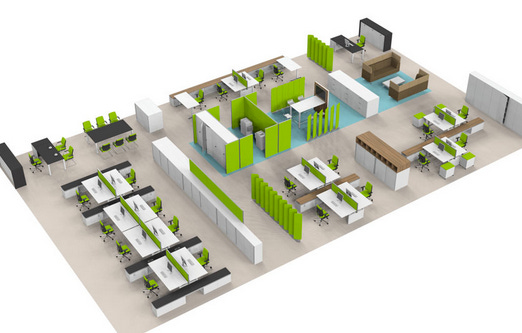3 Things: Startup SaaS Bundle, OS for Office Subleasing, and PMM+Demand Gen Bootcamp
Happy Sunday and happy holidays to you all! I hope you’re getting some time to check out of the daily grind and spend some time with the people you love. Each edition of 3 Things will contain a dive into 3 rabbit holes I’ve found myself going down recently. Subscribe to get each week’s edition straight to your inbox and if you enjoy it, please share! This past week, I’ve been thinking a lot about:
Startup SaaS Bundle
OS for Office Subleasing
PMM + Demand Gen Bootcamp
1. Startup SaaS Bundle
The last decade has been the great unbundling of SaaS, with the average startup now purchasing more than 34 independent SaaS products to run their business. What used to be wrapped up under the umbrella of SAP or Oracle has now been split into hundreds of best-in-class point solutions that startups have opted for. When you start a company, you’re immediately confronted with dozens of tool choices (there are literally a dozen solely for back-office stuff that I previously wrote about in The Ultimate Back Office Guide for Startups). On top of mere analysis paralysis, there are certain considerations that you need to take into account such as cost, compatibility with other products, feature functionality, etc, that requires a tremendous amount of research, hair-pulling, and ultimately decision making. I’ve been making a joke for years that no one else seems to find funny saying “BRING BACK SAP!!” What I’m really trying to say is I welcome the day when there is a bundle that is good enough; a platform that shares the same login, UI/UX, and has 80% of the functionality that a customer could ever ask for.
The honest truth is that most of the software that a startup needs to operate is somewhat commoditized at this point. Don’t need all the functionality of Salesforce (or want to pay the eye-popping sticker price)? There are dozens of cheaper, lightweight CRMs that will serve your needs just fine. Realistically there are about 10 core pieces of software that you’re going to need. This will vary slightly for B2B vs. B2C but for now I’ll focus on B2B. Your stack will look something like this:
GSuite or Office 365 or both (not proposing someone tries to reinvent this… better to just build out of the box integrations)
Team Communication (likely this is Slack and Zoom)
Payroll/HR System
Accounting software
Applicant Tracking System (ATS)
Customer Relationship Management tool (CRM)
Marketing Automation software (email sending tool)
Project Management tool
Issue Tracking software
Customer Support/Helpdesk
There are likely many other tools that individual companies will want for things like onboarding, spend management, code deployment/management and other niche use cases, so I don’t expect that one offering could provide literally everything. I do think that a company can follow the Pareto principle and build the 80% of functionality that everyone needs for each of the tools above and bundle it into a single unified platform. There are always cycles of bundling and unbundling and I think we’ve hit peak unbundling and it’s time for someone to take a crack at bundling the startup stack. I’d specifically target startups initially as it’s unlikely that a more mature company would be willing to rip and replace many of their core business systems at once. Startups however, are often starting from a clean slate and have to research and purchase their entire stack at once (or close to it) so there is an opportunity to catch companies in this stage and provide them with everything they need for the first few years. As time goes on you could upgrade each of the core systems to add more enterprise features and grow with the customer base.
2. OS for Office Subleasing
Even before the pandemic, space planning had notoriously been a challenge for almost any startup. You either outgrow the space you just got well before your lease is up, or you don’t survive long enough to fully enjoy it. You might have planned to grow headcount by 100% and only grew by 30% so are left with far too much space (and a hefty rent bill) or vice versa and you are either sardined or scrambling to find a new office before you expected to. Suffice it to say, it’s a hard problem. Tech startups have a long history of subleasing space to or from other startups to enable a bit more flexibility and less of a financial liability in the case that you need to make a change sooner than anticipated. The challenge is that the process of subleasing is extremely manual which is what enabled the rise of WeWork, Knotel, Spaces, Industrious, and other flexible work companies.
With the pandemic, almost every tech company and even companies in traditional industries are rethinking their office plans. Employees want flexibility and the ability to work someplace that isn’t their home some days a week. Employers want to reduce the second highest corporate expense (the first being payroll) and have learned that people can still be productive at home or away from an office. While I definitely believe that there will be a market for companies like WeWork going forward, there is also an opportunity for a company to act as the operating system (OS) of subleasing office space. Many companies will still choose to have their own physical offices but maybe you want to only use it Monday, Wednesday, and Friday and allow another company to use the space Tuesday/Thursday. Maybe a 4-person company only needs a small space and a conference room that matches perfectly with a larger company’s excess capacity and location. The name of the game is flexibility. Building the orchestration layer and marketplace operating between the property management companies, tenants and subletters could de-risk office leases and provide the right level of flexibility for the vast majority of companies while being asset light and garnering SaaS margins. There are also many expansion or partnership opportunities in spaces such as workplace management software like Eden or SpaceIQ.
3. PMM + Demand Gen Bootcamp
While my current official day job is as an early stage investor, my background is primarily in Growth Marketing and Product Marketing at SaaS companies. In addition to investing, I also lead our firms Growth and Go-To-Market programs for the portfolio which means I spend a good chunk of time helping all types of companies think through their hiring and strategy as it relates to GTM. I get asked at least once a week for help finding the same unicorn Marketer. Nearly every Seed/Series A B2B SaaS company is looking for someone with both a Product Marketing background as well as deep expertise in Lead and Demand Generation (and all of the analytical skills that come along with that). While these people do exist, they are extremely rare and hard to find, and it’s often hard to know what to even look for.
The request is so consistent that it has led me to believe with 100% confidence that if someone built a bootcamp or training program like Reforge (focused on Growth) or Flockjay (focused on Sales) but focused on educating a crop of hybrid Product/Growth Marketers it would be wildly successful. I think I can safely assume that 75%+ of venture-backed B2B startups would want to hire this type of person and I can also tell you that these skills are highly trainable if you have some background in one of the disciplines. The focus would be on people with a few years of experience under their belt who are looking to become the Dir/VP/Head of Marketing at an early stage SaaS company. The bootcamp would leverage experts teaching modules (and recording the sessions for infinite scalability) on a variety of topics ranging from messaging & positioning, pricing & packaging, attribution & funnel management, paid digital campaigns, and everything in between. Stay tuned on this one… something may be in the works 😉
That’s all for today! If you have thoughts, comments, or want to get in touch, find me on Twitter at @ezelby and if you enjoyed this, please subscribe and share with a friend or two!
~ Elaine



